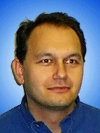

Adaptive Signal Processing of Noncircular Complex Signals
Dr. Danilo Mandic
Imperial College London, United Kingdom
Prof. Scott Douglas
Southern Methodist University, TX, USA
Background
Processing in the complex domain is a standard in key applications of adaptive signal processing, such as in communications, radar, sonar, and array signal processing. Most signals used in communications are complex by design (man-made) and it is convenient to make their probability density functions and noise models rotation invariant (proper), whereas signals made complex by convenience of representation (DoA, radar, wind) are bound to exhibit noncircular distributions (improper). Standard solutions inherently assume second order circularity, and are therefore inadequate when high accuracy and separability are paramount.
In addition, recent progress in wireless communications, radar, sonar, mathematical biosciences, and renewable energy, has brought to light problems where multidimensional data natures, uncertainty, multipath, and nonlinearity play major roles. The noncircularity of the data and the widely linear natures of the associated system models have spurred the development of novel, so called 'widely linear' or 'augmented' statistical signals processing algorithms that are optimal for both second order circular and noncircular processes - these are invariably based on so called augmented complex statistics.
The statistical theory of improper complex random signals, called augmented complex statistics, was initiated in mathematics some fifteen years ago and is still being developed, and its applications in statistical signal processing are rapidly emerging. The two presenters have been at the forefront of the development in this area, and have produced several key results in adaptive signal processing of noncircular complex random signals, both supervised and blind. These include the augmented complex least mean square (ACLMS), augmented complex recursive least squares (ACRLS), affine projection, Kalman filtering, and blind source separation algorithms, together with their convergence and stability studies.
Tutorial Aims
This tutorial will bring together latest advances in augmented complex statistics and will introduce a suite of adaptive signal processing and blind source separation algorithms under the umbrella of widely linear modelling. Our aim is to:
- Provide a theoretical and computational platform for statistical signal processing of the generality of complex valued signals (both proper and improper);
- Give an in-depth insight into widely linear estimation, the role of noise and eigenstructure of correlation matrices;
- Revisit the complex gradient and Hessian, and introduce the CR calculus;
- Present tests for the degree of noncircularity and use this information as an additional degree of freedom in detection and estimation problems;
- Introduce a suite of adaptive signal processing algorithms suitable for the filtering of both second order circular and noncircular signals;
- Illustrate the performance and convergence of widely linear adaptive filtering algorithms for both circular and noncircular data;
- Introduce blind source separation and extraction algorithms in this context;
- Provide simulation studies, including prediction, tracking, beamforming, and source separation in communications and biomedicine.
Related talks
Drs Mandic and Douglas have previously presented parts of the proposed tutorial to various audiences from academia and industry. This includes tutorials in leading international conferences (IJCNN, ICASSP) and a number of invited lectures. We believe that the combination of our expertises is likely to be of significant interest to both researchers and practitioners in engineering areas spanning communications, adaptive and array signal processing, radar, sonar and biomedicine.
The proposed tutorial therefore provides a complete and rigorous overview of state-of-the-art in the area, supported by practical applications and working solutions.
Presenters
- Danilo Mandic, Imperial College London, United Kingdom
E-mail: d.mandic@imperial.ac.uk - Scott Douglas, Southern Methodist University, TX, USA
E-mail: douglas@engr.smu.edu
Biographies
Danilo P. Mandic has been working in the area of nonlinear and adaptive signal processing for more than 15 years, and is now a Reader (Associate Professor) at the Department of Electrical and Electronic Engineering, Imperial College London, UK. His work on complex valued and nonlinear adaptive signal processing has been widely published, and some of the concepts relevant to this tutorial can be found in his research monographs Recurrent Neural Networks for Prediction, Wiley 2001 (with J. Chambers) and Complex Valued Nonlinear Adaptive Filters, Wiley 2009 (with S. L. Goh). Dr. Mandic has been a Member of the IEEE Signal Processing Society Technical Committee on Machine Learning for Signal Processing, Associate Editor for IEEE Transactions on Neural Networks, IEEE Transactions on Signal Processing, IEEE Transactions on Circuits and Systems II, and Associate Editor for International Journal of Mathematical Modelling and Algorithms. He has authored several awarded papers and has received awards for products arising from his collaboration with industry.
Scott C. Douglas received the B.S. (with distinction), M.S., and Ph.D. degrees in Electrical Engineering from Stanford University, Stanford, CA. He is currently a Professor in the Department of Electrical Engineering at Southern Methodist University and the Associate Director of the Institute for Engineering Education at SMU. His research activities include adaptive filtering, active noise control, blind deconvolution and source separation, and VLSI/hardware implementations of digital signal processing systems. Dr. Douglas is the author or co-author of two books and about 200 artices in journals and conference proceedings. He is a senior member of the IEEE, a past associate editor for the IEEE Transactions on Signal Processing (IEEE), the IEEE Signal Processing Letters (IEEE), the Journal of Signal Processing Systems (Springer). He has served the General Chair of ICASSP 2010 and the Secretary of the Signal Processing Education Technical Committee of the IEEE Signal Processing Society. He has played an integral role in developing and managing the Infinity Project, an effort among university faculty, high-tech industry, and civic educational leaders to bring an exciting and practical engineering curriculum to all U.S. high school students.




